|
Celebrating the birth and legacy of JAMES BALDWIN. One of the 20th century’s greatest writers, James Baldwin was a playwright, essayist, novelist, and a voice of the American civil rights movement. $$PLAIN_TEXT_PREVIEW$$
Celebrating the birth & legacy of
|
“I am what time, circumstance, history, have made of me, certainly, but I am also, much more than that. So are we all.”— James Baldwin
|
One of the 20th century’s greatest writers, James Baldwin was a playwright, essayist, and novelist. With piercing observations on racial, sexual, and social issues in American culture, he became a voice of the American Civil Rights Movement.
|
|
He was born on August 2, 1924 in Harlem, New York to Emma Jones, a young single mother who later married a Baptist minister named David Baldwin when James was about three years old. Despite their strained relationship, Baldwin followed in his stepfather's footsteps and served as a youth minister in a Harlem Pentecostal church from the ages of 14 to 16 (undoubtedly an influence in his writing the play, The Amen Corner). After graduating from high school in 1942, Baldwin had to delay attending college to help support his family. He eventually moved to Greenwich Village, popular with artists and writers, and devoted himself to writing a novel. Through his friendship with writer Richard Wright, Baldwin was awarded a fellowship and started to gain attention with his essays and short stories.
Three years later, he obtained another fellowship and went to Paris, a move that changed his life. "Once I found myself on the other side of the ocean, I see where I came from very clearly . . . I am the grandson of a slave, and I am a writer. I must deal with both," Baldwin said.
|
“I was born in the church. I knew that out of the ritual of the church, historically speaking, comes the act of the theatre, the communion which is the theatre. And I knew that what I wanted to do in the theatre was to recreate moments I remembered as a boy preacher, to involve the people, even against their will, to shake them up, and, hopefully, to change them.”
|
|
His first novel, Go Tell It On The Mountain, was a semi-autobiographical story centered on the life of a young man growing up in Harlem and struggling with his father and religion. The novel was published in 1953. Time Magazine and The Modern Library rank it on the list of 100 best English-language novels.
His essays, Notes of a Native Son (1955) and Nobody Knows My Name: More Notes of a Native Son (1961) offer an unflinching look at the Black experience in the United States. In 1963, Mr. Baldwin was featured on the cover of Time Magazine after publishing The Fire Next Time, two essays addressing racial tensions in America, as well as the role of religion and the need for change in how we think about race. "There is not another writer — white or Black — who expresses with such poignancy and abrasiveness the dark realities of the racial ferment in North and South," Time said in the feature.
|
|

|
Baldwin’s first play, The Amen Corner was performed at Howard University in 1955 and on Broadway in 1965 (produced by Mrs. Nat Cole and starring Bea Richards as Sister Margaret). The story centers on a storefront Pentecostal church and explores the potential for religion to both hurt and heal. |
|
|
Baldwin’s second play, Blues for Mister Charlie, debuted on Broadway in 1964 and was loosely based on the 1955 racially motivated murder of Emmett Till.
His later works include No Name in the Street (a collection of essays written in 1972), a collection of poems and the novel Harlem Quartet (1987).
James Baldwin died December 1,1987 in France. An openly gay writer with astute observations of race, sexuality, and class in American culture, James Baldwin is considered one of the greatest writers of our time. His plays, essays and novels continue to have a profound resonance to this day.
|
“In his vast body of work, Baldwin showed us how to bear witness to the past ‘with both pride and despair,’ so that we could break from the tragedy of the present. Baldwin told the stories of Black Americans who came ‘from a long line of runaway slaves who managed to survive without passports.’ And in these histories, he reminded us of what it might mean to be an American.”
— Leah Mirakhor, Los Angeles Times Op-Ed, August 2, 2020
|
Learn more about JAMES BALDWIN:
|

|
We will continue to celebrate the birth of James Baldwin with a performance of a monologue from one of his plays by Actors Co-op company member, Kimi Walker! These performances will be delivered to you for safe viewing at home, via email. |
Give a gift and become an Actors Co-op Luminary!We have been honored by the outpouring of generosity and support we have received from you in this crisis. As we look to the future with hope, we are so grateful to our community for the faithful generosity shown during these times!
|
|
|
|
|